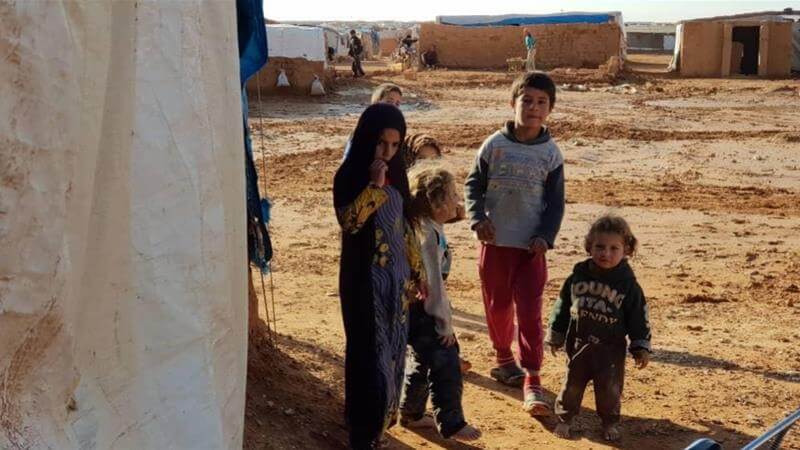Children in the Rukban camp in southeast Syria (File)
At least eight children have died in the Rukban camp for 50,000 displaced Syrians, amid freezing temperatures and shortages of food, medicine, and essential goods.
The residents of the camp, in a barren area in southeast Syria near the Jordanian camp, have endured years of deprivation since fleeing their homes amid Islamic State attacks in late 2015. The crisis has been accentuated by a blockade by the Assad regime and Jordan’s closure of its border to movement of supplies.
Last autumn the regime’s forces cut the main route into Rukban, preventing Bedouin traders from bringing goods. Damascus has allowed only two UN aid deliveries since January 2018. Medics reported deaths from shortage of food and medicines and the lack of basic health care.
Residents have refused attempts to return them to their home areas, fearing detention, forced conscription, and seizure of their property by the regime.
Syria Daily, Jan 4: Rukban Camp’s Displaced Appeal for Move to Northwest
Syria Daily, Oct 16: 50,000+ Displaced at Risk as Assad Regime Cuts Off Rukban Camp
The UN children’s agency UNICEF confirmed the latest death and called them a “man-made” tragedy.
“The lives of babies continue to be cut short by health conditions that are preventable or treatable,” said Geert Cappelaere, UNICEF’s regional director for the Middle East. He said “more children will die, day in, and day out” unless they are provided with safer shelters and reliable healthcare.
UNICEF said most of the children who have died are under four months old. The youngest was born only an hour earlier.
About 80% of the camp’s estimated population are women and children.
Syria Daily, Oct 6: Trapped — The Pregnant Women in the Rukban Camp
No Hope for Relief
One resident, Abdul Karim, described the death of his two-month-old daughter Khadija. He said there was no ehating for the tent and no month to buy medicine. His wife was unable to breast-feed the infant because of malnutrition.
Karim could consider going into regime-held territory because he might be arrested as a “terrorist” supporter. He tried to take Khadija to a medical center in Jordan but “they have banned us”.
Wissam Khaled, who fled to Rukban from Homs Province, summarized, “Food, medicine, all is coming only from the smugglers and it is very expensive. People cannot afford it because they do not have any money, because there is no work here.”
He also blamed the US, as Rukban is within a 55-km (34-mile) exclusion zone around the American base at Tanf on the Iraqi and Jordanian borders.
“The Americans have not sent anything, no doctors,” he said. “We only have a few nurses but they do not know much and have very limited medicines.”
Bassam Barabandi, who runs an activist group, added, “The American army always says their mandate is to fight ISIS only. They say they have no humanitarian mandate and do not want to own this problem.”
The crisis has been compounded by the prospect of American withdrawal after Donald Trump’s December 19 order for the departure of all 2,000 US troops from Syria. Wissam Khaled says:
If the American soldiers leave, it will be very dangerous for us. Then regime forces will come to arrest us, or we don’t know what will happen. People are very scared.
“Trump’s Withdrawal Leaves 50,000 in Syria’s Rukban Camp to Die”


Trackbacks/Pingbacks